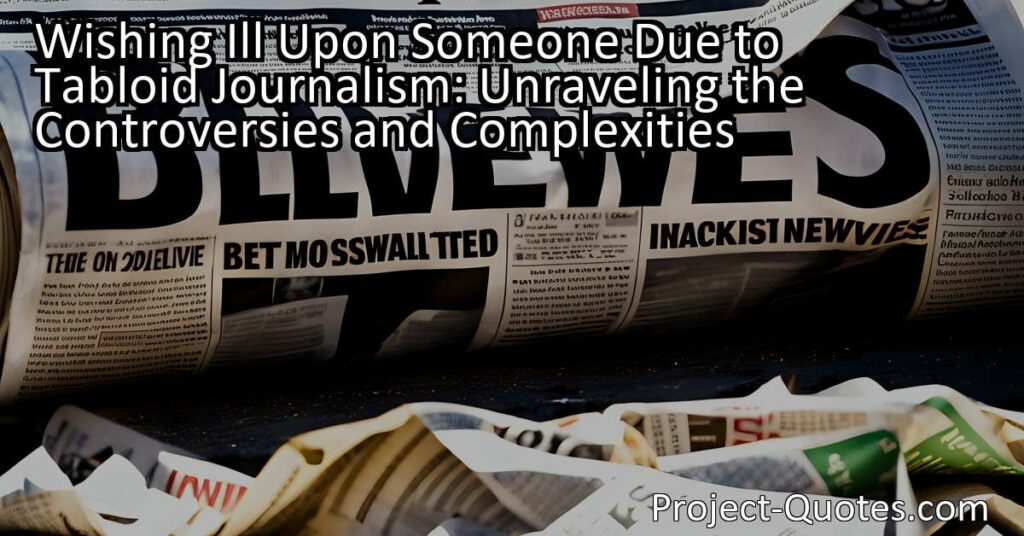There’s a lot of people who feel there’s a tabloid journalist who had it coming.
Ralph Fiennes
Tabloid journalism and the controversies surrounding it are explored in this engaging summary. It delves into the ethical concerns of this type of journalism and the potential consequences of wishing harm upon individuals involved in the industry. Ultimately, it emphasizes the importance of empathy and understanding in our discussions on this topic.
Table of Contents
Meaning of Quote – There’s a lot of people who feel there’s a tabloid journalist who had it coming.
In his thought-provoking quote, Ralph Fiennes shines a light on the controversial world of tabloid journalism, suggesting that there are people who believe those reporters deserve the difficulties they encounter. With this idea as a starting point, let’s delve deeper into the complex and multifaceted nature of tabloid journalism, examining its role in our society, its impact on individuals, and ultimately, the question of whether anyone truly deserves the hardships that may befall them.
Tabloid journalism, often characterized by sensationalized stories and a focus on celebrity gossip, has long been a subject of debate and criticism. Critics argue that tabloids prioritize entertainment value over ethical reporting, exploiting and invading the private lives of public figures. The hunger for scandal and salacious details often leads to a paparazzi culture that relentlessly pursues celebrities, sometimes crossing boundaries and infringing upon their privacy. In this sense, it is understandable why some may believe that tabloid journalists deserve the repercussions they face.
However, it is essential to remember that journalism, in its truest form, serves a crucial role in society. Journalists play a vital role in holding those in power accountable, investigating issues of public interest, and providing citizens with the information necessary for an informed democracy. While tabloid journalism may divert from this purpose, not all journalists working for these publications can be painted with the same brush. Many reporters find themselves in this field due to limited opportunities or other circumstances and may be skilled professionals who are seeking to make a living doing what they love.
Moreover, it is crucial to acknowledge that tabloid journalists are not the only individuals responsible for the existence of sensationalized media. Consumers play an active role in fueling the demand for such content. The allure of celebrity gossip and scandal cannot be solely attributed to the efforts of tabloids. These publications operate on a business model that relies on the interest and support of the public. As such, criticizing tabloid journalists without acknowledging the complicity of society as a whole in perpetuating this culture would be disingenuous.
It is worth considering another perspective on the notion that tabloid journalists deserve their fate. Just like any other profession, journalists deserve to be treated with respect and dignity, regardless of the nature of their work. Everyone is entitled to their human rights, including privacy and a fair treatment. While it might be easy to condemn certain individuals in the media, it is important not to lose sight of their shared humanity.
One must also take into account the potential consequences of wishing ill upon someone due to their profession. If we begin to justify harm or difficulties befalling individuals, regardless of their occupation, we set a dangerous precedent. Society is built upon empathy, compassion, and the belief that every person has inherent worth. By subscribing to the idea that tabloid journalists deserve their misfortune, we risk devaluing not just their humanity, but the humanity of different groups of people. This can have detrimental effects on our collective sense of community and our ability to empathize with others.
While tabloid journalism undoubtedly has its flaws, it is essential to approach this issue with the understanding that painting an entire profession with broad brush strokes oversimplifies the complexities at play. Each individual journalist has their unique motivations, circumstances, and ethical considerations. In our discussions and criticisms, it is vital to engage with empathy, weighing the broader societal implications, and considering the humanity of individuals involved.
In conclusion, Ralph Fiennes raises a thought-provoking point regarding tabloid journalism and whether tabloid journalists deserve the challenges they face. By exploring the multi-layered nature of this subject, we can better understand that tabloid journalism is a much more nuanced issue than it may appear on the surface. While some may assert their belief that these journalists have brought their hardships upon themselves, it is crucial to approach this topic with empathy, recognizing the value and humanity in all individuals, regardless of their occupation. By doing so, we can foster a more compassionate and inclusive society, where dialogue and understanding prevail over judgment and condemnation.
I hope this quote inspired image brings you hope and peace. Share it with someone who needs it today!


